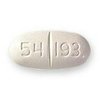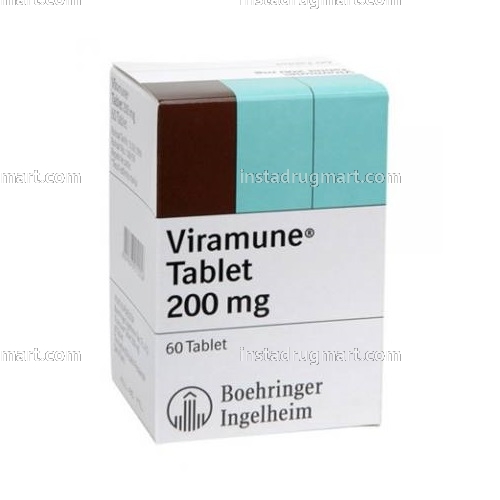Viramune
Viramune 200 mg
| Package | Price | Per pill | Save | Order |
|---|---|---|---|---|
|
120 pills - 200 mg |
$367.25 | $3.07 | $245.98 | Buy now! |
|
90 pills - 200 mg |
$297.95 | $3.31 | $161.97 | Buy now! |
|
60 pills - 200 mg |
$224.12 | $3.73 | $82.49 | Buy now! |
|
30 pills - 200 mg |
$153.31 | $5.11 | No | Buy now! |
Drug Title
Viramune (Nevirapine)
Drug Uses
This medication is used in the treatment of infection with the HIV virus (the virus that causes AIDS). It is used in combination with other HIV medications in selected patients. No cure exists for HIV infection, and the illnesses associated with your disease (infections, etc.) may continue. Because HIV can quickly become resistant to this medication if used alone, viramune must be used with at least 1 other anti-HIV medication. Your doctor may change your treatment plan if this medication stops working well.
Mode of Application
Take by mouth as directed. The usual dose is one 200 mg tablet daily for the first 14 days, then followed by one 200 mg tablet twice a day. Viramune is taken with at least one other medication (antiretroviral) for HIV. It is important to follow the dosing instructions carefully in order to minimize serious side effects, such as rash. If a rash develops in the first two weeks, the viramune dose is not increased until the rash is gone. If treatment is stopped for more than 7 days, then re-treatment should begin as directed by your doctor, usually with one 200 mg tablet daily for 14 days, then one 200 mg tablet twice a day. Read the Patient Information Leaflet available from your pharmacist. If you have any questions, consult your doctor or pharmacist.
Drug Class and Mechanism of Action
Viramune is an oral medication that is used for the treatment of infections with the human immunodeficiency virus (HIV). It is similar to efavirenz (Sustiva) and delavirdine (Rescriptor). Viramune is in a class of drugs called reverse transcriptase inhibitors which includes zalcitabine (Hivid), zidovudine (Retrovir), didanosine (Videx), and lamivudine (Epivir). During infection with HIV, the HIV virus multiplies within the body's cells. The newly-formed viruses then are released from the cells and spread throughout the body where they infect other cells. In this manner, the infection spreads to new, uninfected cells that the body is continually producing, and HIV infection is perpetuated. When producing new viruses, the HIV virus must manufacture new DNA for each virus. Reverse transcriptase is the enzyme that the virus uses to form this new DNA. Viramune directly inhibits the activity of reverse transcriptase and blocks the production of DNA and new viruses. Unlike zidovudine, nevirapine does not need to be converted to an active form and it does not compete with the compound (thymidine triphosphate) that is required by HIV virus to make new DNA. Viramune does not kill existing HIV virus and it is not a cure for HIV.
Missed Dose
If you miss a dose, use it as soon as you remember. If it is within 2 hours of the next dose, skip the missed dose and resume your usual dosing schedule. It is important not to miss doses of this drug.
Storage
Store at room temperature between 59 and 86 degrees F (15 to 30 degrees C) away from moisture and light as directed. Do not store in the bathroom. Keep in a tightly closed bottle.
Precautions
This medication should not be used if you have certain medical conditions. Before using this medicine, consult your doctor or pharmacist if you have: severe liver disease. Tell your doctor your medical history, especially of: liver disease (including Hepatitis B or C infections), severe kidney disease, any allergies.
This medication should be used only when clearly needed during pregnancy. Discuss the risks and benefits with your doctor.
This drug is excreted into breast milk. Because breast milk can transmit HIV, do not breast-feed. Viramune has infrequently caused severe (sometimes fatal) liver and skin reactions (e.g., Stevens-Johnson syndrome, allergic reaction), especially during the first 18 weeks of therapy. These reactions are most likely to occur during the first 6 weeks of therapy but can occur at any time while taking viramune. If you develop a rash at any time while using this medication, or if you develop unusual fatigue, abdominal or stomach pain, dark urine, loss of appetite, or yellowing of the skin or eyes, seek immediate medical attention (liver function tests should also be done at this time). If you had a severe liver or skin reaction while on this drug in the past, you should not restart therapy with viramune again. Consult your doctor or pharmacist for more details.
Side Effects
Nausea or headache may occur. Notify your prescriber if these problems persist or worsen. Notify your prescriber immediately if you develop: fever, blistering, mouth sores, pink eye (conjunctivitis), swelling, muscle/joint aches, tingling or numb hands or feet. Changes in body fat may occur while you are taking this medication (e.g., increased fat in the upper back and stomach areas, decreased fat in the arms and legs). The cause and long-term effects of these changes are unknown. Discuss the risks and benefits of therapy with your doctor, as well as the possible role of exercise to reduce this side effect.
A serious allergic reaction to this drug is unlikely, but seek immediate medical attention if it occurs. Symptoms of a serious allergic reaction include:
- severe rash, itching, swelling, dizziness, trouble breathing. If you notice other effects not listed above, contact your doctor or pharmacist.
More Information
Viramune has not been shown to reduce the chance of transmitting the HIV virus to others. Laboratory tests (e.g., liver function especially if rash occurs) will be performed in order to monitor for drug side effects. These tests will be done frequently and will be monitored closely by your doctor especially during the first 18 weeks of treatment. Keep all doctor's appointments while taking this medication.

























